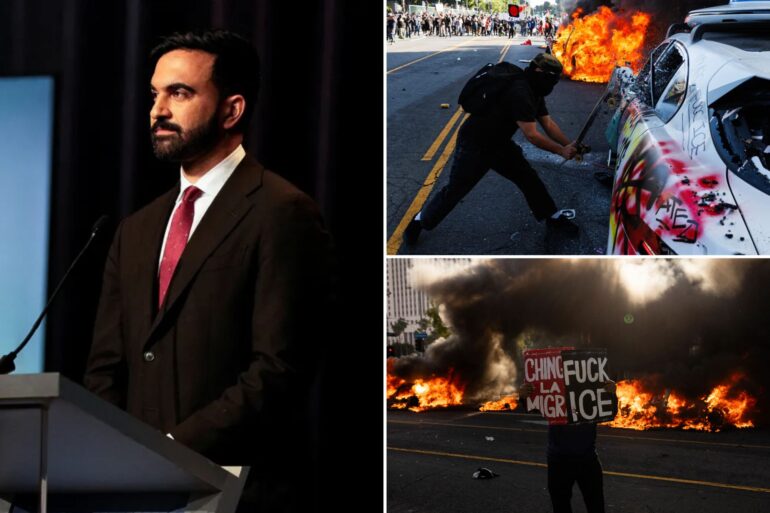🔴 Website 👉 https://u-s-news.com/
Telegram 👉 https://t.me/usnewscom_channel
Five years ago this month, chaos engulfed New York City’s streets. The turmoil that followed the killing of George Floyd saw hundreds of NYPD officers injured in melees featuring fists, bricks and Molotov cocktails.
Looters robbed storefronts, smashing windows and making off with millions in stolen goods.
As early voting begins in the mayoral primary, New Yorkers must decide what type of leader they want when the going gets tough.
Weak mayors have floundered under the pressure of civil unrest.
In 1991, David Dinkins allowed the Crown Heights rioters to “vent” their anger for three days — by terrorizing Jewish residents and shopkeepers.
Progressive Bill de Blasio sympathized with Black Lives Matter marchers in the summer of 2020, saying, “For all of us who know white privilege, we have to do more because we don’t even fully recognize the daily pain that racism in this society causes.”
At then-Gov. Andrew Cuomo’s prompting, de Blasio placed the city under the first curfew since 1945. Cops were first told to enforce it — then not to.
Demonstrators defied the order. As turbulence continued, the bumbling de Blasio took enormous heat from the left for defending police tactics that ultimately reined in the unruly crowds.
Months later, he lamented that cops had used “excessive enforcement,” adding, “I look back with remorse.”
History is rhyming: Similar scenes have erupted recently in Los Angeles, Portland, Chicago, Seattle and other cities against President Donald Trump’s immigration enforcement actions.
In LA, the current epicenter, look no further than Mayor Karen Bass for a master class in failing to meet the moment.
Amid burned-out driverless cabs and looted luxury stores, Bass pointed the finger at Trump, saying her “biggest fear is the impact that all Angelenos will begin to feel when the labor of immigrants is absent.”
New York, for now, has prevented the worst of LA-style chaos.
For that, Mayor Eric Adams and Jessica Tisch, his first-rate police commissioner, deserve recognition.
But the prospect for greater civil unrest in New York raises the stakes for the mayoral election. Gotham voters must decide: When protests get out of hand, who should they trust to restore peace and order?
At Thursday’s debate, Cuomo crowed that Trump never sent the National Guard to New York to quell the city’s riots in 2020.
“Donald Trump only picks fights that he can win. He cannot win a fight with me as mayor of New York,” he said.
Cuomo is walking a fine line: Convincing Democrats he’s tough enough to confront Trump, but also able to win the peace through a begrudging mutual respect.
The other leading contender, Zohran Mamdani, instead lamented that the NYPD is assisting federal immigration enforcement, vowing that would stop under his leadership.
In the first half of 2020, Mamdani was a first-time assembly candidate who had just abandoned his ill-fated rap career.
Backed by the Democratic Socialists, he committed to an “Agenda for Decarceration” that included pledges to eliminate cash bail entirely, decriminalize simple drug possession and sex work, and “fight the construction of new carceral facilities.”
As that summer’s violence spilled out across city streets, he was one of the leading singers in the chorus to defund the police, demanding a $1 billion cut.
In one Facebook post, he blasted a proposal to move $300 million from the NYPD budget to the education budget, calling it an attempt “to take credit for defunding the police without actually doing it.”
Scott Stringer and Brad Lander, once fellow police-defunders, have since moderated. To their credit, they now support hiring more officers, as does Cuomo.
Mamdani, however, is a true believer.
He still wants to redirect $1.1 billion from the NYPD to create a new department focused on mental health teams and “gun violence interrupter” programs.
With the police force already at a three-decade staffing low and struggling to recruit, Mamdani’s plan could leave New Yorkers without cops when the city needs them most.
If — and when — violence spills out into the streets, who would restore order?
Between rising antisemitism, elevated levels of felony assaults — including against police officers — and the high likelihood of local resistance efforts against the Trump administration, the next mayor must be prepared to confront turmoil on New York’s streets.
With zero executive experience, the 33-year-old Mamdani has never been responsible for guaranteeing the public’s safety.
If he became mayor, he’d have to learn how to deal with protests in on-the-job training — putting him at an immediate disadvantage against Trump, who understands the political upside of restoring order.
Mamdani recently said the best mayor of his lifetime was Bill de Blasio. New Yorkers must decide whether they want the sequel.
John Ketcham is director of cities and a legal policy fellow at the Manhattan Institute. All views expressed are those of the author and not the Manhattan Institute.

